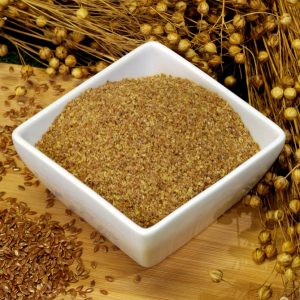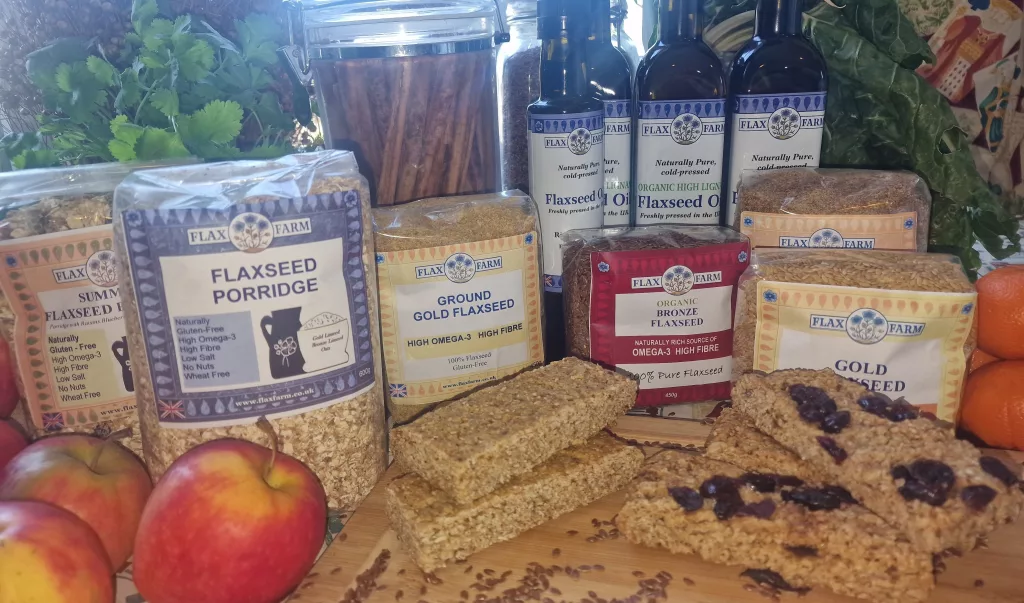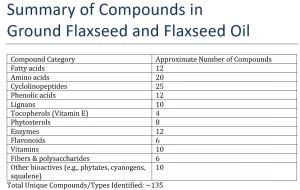Chemistry, Flaxfarm, Terminology
The Synergy of Flaxseed: Why this Little Seed has More Benefits Than You’d Expect
Introduction & Key Info
Flaxseed contains a large number of nutrients that can be beneficial for health. We tend to concentrate on just a few nutritional components that are used therapeutically or supportively because they work so well. I am going to explore its 130+ other nutritional elements.
- Omega-3 is why Flaxseed Oil is a key component of the Budwig Diet, Overcoming MS Recovery Plan, and often prescribed for autoimmune conditions, skin, joints and heart health.
- The fibre in Flax is why it is often prescribed for the digestion by holistic health professionals, herbalists and doctors
- Lignans are used for their hormone balancing properties to support women going through the menopause
- The lack of available carbohydrate and a very low glycaemic index make Flaxseed useful for people losing weight, following a diabetic diet and keto diets.
- It is truly holistic how it works. All these Flax components with many of pull together synergistically, supporting health all round the body which helps make it easier for the body to help itself and work the way it should.
Loving the Nutrients in Flaxseed for Over 20 Years
I’ve been using flaxseed – to very good effect – for more than 20 years and have always been intrigued by its range of powerful benefits. Flax is often lumped in with other seeds and nuts when people talk about “nutrient powerhouses,” but this is misleading – flax has a unique set of hard-to-find highly beneficial nutrients and repeatedly outperforms other “superfoods” and supplements. Even a small amount added to the diet can have amazing therapeutic effects across many systems of the body. It’s a favourite remedy for many conditions and regularly prescribed by holistic health practitioners and even doctors.

All This in One Little Seed
When Nature created flaxseed, it put a huge number of compounds and nutritional components into one tiny seed. These components were designed to protect the seed and enable it to metabolise nutrients to grow a new plant, complete with all its complex biology, that will grow, flower and reproduce itself. How amazing is that?
As in all plants, these components work together synergistically. There are also many lesser-known compounds in flaxseed – some too minor to list, others still being studied by science. Nature took millions of years perfecting this. As humans evolved, we learned to benefit from these intricate plant-based systems for our own nutrition and health.
Works better than the Sum of its (Many) Parts
We are designed to eat whole foods, which is why they are healthier for us than isolated extracts or synthetic supplements. Flaxseed just happens to be one of the most nutrient-dense whole foods – full of elements missing from much of the modern diet. Several of these compounds make a dramatic difference to health when added individually but mostly working better as wholefoods, i.e. ground flaxseed or flaxseed oil.
Over and over again, various studies have shown flaxseed and flaxseed oil to work better than their components even when compared to other seeds. Researchers investigating flaxseed and flaxseed oil have found it hard to separate the different beneficial effects of flaxseed. This is one of the reasons Flax Farm doesn’t refine flaxseed oil.
A Food as Nature Intended
Many modern crops have been bred for supermarket shelf life rather than nutrition, resulting in nutrient losses. Flax, however, remains largely unchanged from its ancient form – still offering its original suite of health benefits.
Its use for health dates back as far as Ancient Babylon, and its role as a food is even older. Some of flaxseed’s benefits have only recently gained scientific recognition in the context of modern lifestyle-related diseases. Much of its benefit stems from being an excellent source of several key nutrients. Science continues to uncover ways that flaxseed’s effects are greater than the sum of its parts.
Main Nutrients in Flaxseed
Fat (Approx. 42%)
One of the things Flax is famous for is being the richest food source of omega-3, so that’s where we will start. Like all natural sources of fat or oil, flaxseed contains a mix of different fatty acids. Whilst it contains a small amount of saturated fats the high omega-3 level helps ensure this more healthily metabolised. Flax’s fatty acid profile makes it a particularly beneficial addition to the typical Western diet.
Key Fatty Acids:
- Omega-3 ALA (C18:3 n-3): 53–58%
- These are essential components of cell membranes (especially in the brain) hormones, the body’s signalling, immune systems and metabolism. Flaxseed is the richest plant-based source of alpha-linolenic acid (ALA), a type of omega-3, ALA is essential because the body cannot produce it. In the past, ALA was considered inferior to fish-based omega-3s like EPA and DHA. Modern studies have shown ALA can be even more beneficial, which has been shown to be the case in studies of people following protocols that use flaxseed oil.ALA is the essential, parent omega-3 that we can’t make in our body. Though we can make other fats, including oleic fatty acid and fat that gives us muffin tops and visceral (abdominal) fat. We make EPA and DHA from ALA as necessary. The more we use this omega-3 the more efficient it is, Interestingly, the omega-3 in flaxseed oil can contribute to a slimmer waist, less abdominal fat and lower bodyweight.
- Omega-6 LA (C18:2 n-6): 12–14%
- Flaxseed also contains linoleic acid (LA), an essential omega-6 fatty acid. It is less inflammatory than arachidonic acid (ARA), the omega-6 found in red meat, poultry, eggs, and dairy. While omega-6 fats are necessary, modern diets often contain them in excess, leading to chronic inflammation. The small amount of omega-6 in flaxseed is typically of little concern, and for those who avoid animal products or eat a low-fat diet, flaxseed provides a useful source of this essential fat.
- Omega-9 Oleic Acid (C18:1 n-9): 12–15%
- Best known from being found in olive oil, this monounsaturated fat is neither inflammatory nor anti-inflammatory— metabolically it’s fairly neutral.
- Other Fats:
- Palmitic acid – C16:0
- Stearic acid – C18:0
- Arachidic acid – C20:0
- Behenic acid – C22:0
- Lignoceric acid – C24:0
- Eicosenoic acid – C20:1
- Myristic acid – C14:0
- Caproic acid – C6:0 (trace)
- Caprylic acid – C8:0 (trace)
Other Compounds found in the Oil of Flaxseed
These are oil-soluble compounds. Some of these help preserve the oil and assist in the metabolising of the components of flaxseeds into a new seedling. They also help make flaxseed oil “less oily”, easier to incorporate into food and probably make it more digestible.
- Tocopherols (Vitamin E):
Flaxseed oil contains several forms of tocopherols, especially γ-tocopherol, which is known to be a powerful antioxidant. . - Carotenoids:
Flaxseed oil contains carotenoids such as lutein and beta-carotene, which help give the oil its colour and contribute to its antioxidant properties, including eye health. - Phytosterols:
These plant sterols in flaxseed oil and may contribute to Flaxseed and Flaxseed Oil’s reputation for helping support heart health and healthy cholesterol levels. - Phospholipids:
Phospholipids are important components of cell membranes and contribute to various biological functions. They act as emulsifiers and help make oil more miscible with water – and when you make a vinaigrette with flaxseed oil, it tends to stay mixed with the vinegar better. - Other Compounds:
The oil also includes smaller amounts of other oil-soluble compounds and fats, such as monoacylglycerides, diacylglycerides, sterol esters, and waxes. These help the seed work better in certain ways. As yet, we don’t know if they have any special benefits for human health. - Cyclic Peptides:
These naturally occurring cyclic peptides in flaxseed oil have been shown to inhibit lipid oxidation, helping to protect the oil from going rancid.
Protein (18–20%)
Protein is made up of amino acids. Flaxseed contains all nine essential amino acids, though it is considered an “incomplete” protein because it is relatively low in lysine. However, lysine is readily available in other foods such as beans, lentils, soy, meat, eggs, dairy, and nuts. The term “incomplete” protein is no longer considered a problem for people eating a balanced, varied diet because the body is highly efficient at using and metabolising amino acids that eaten at other times. So at 18–20%, flax is a valuable source of plant-based protein, which is particularly useful for people cutting back on animal based protein.
- Essential Amino Acids:
- Leucine
- Isoleucine
- Valine
- Lysine
- Methionine
- Threonine
- Phenylalanine
- Tryptophan
- Histidine
Non-Essential Amino Acids: Glutamic acid, aspartic acid, arginine (abundant), serine, glycine, alanine, proline, cysteine, tyrosine, asparagine, glutamine
Carbohydrates (at least 5 main types)
- Starch and “sugars” in trace amounts only
One of things that’s special about Flax is what it doesn’t have. For a plant food it is incredibly low in available carbohydrate. Most of the “carbohydrate” in flax, when analysed, is in the form of fibre of various types. This gives it a very low GI (glycaemic Index) and makes it useful in low-carb, diabetic, weight-loss and keto diets especially when it is such a satisfying food to eat so it can be beneficially be used to replace some of the carbs in meals.
As its carbohydrate is predominantly fibre rather than starch or sugar, it is the “opposite” of a refined carbohydrate, which means adding some ground flax to carby foods makes them much healthier, lower glycaemic index and this helps support digestive health and blood sugar balance.
Fibre ~ 27- 30%
Fibre is the component of flax that isn’t digested though soluble fibre is fermented by our gut biome so doesn’t come out unaltered. Flaxseed is an rich source of both soluble and insoluble fibre, which together contribute to gut health, blood sugar regulation, and overall digestive wellbeing. A high-fiber, natural diet can lead to measurable healthy changes in gut microbiome diversity within a relatively short timeframe. Studies have shown that increasing fibre intake can alter gut microbiome composition in as little as two weeks. However, long-term benefits and establishing a more diverse and stable gut microbiome may take several weeks or even months depending on your starting point.
Flaxseed contains both soluble and insoluble fibre, contributing to satiety, blood sugar balance, digestive regularity, and gut microbiome diversity.
Insoluble Fibre 18%
- Cellulose,
- Lignin
- Hemicelluloses
This is the fibre that is tough and even woody, it goes all the way through the digestive system undigested. It adds to the bulk helps keep you feeling full, improving the passage of food through the gut. It can contribute to maintaining moisture, gives bulk to the stool and helps regulate bowel movements. Also promotes satiety.
Soluble Fibre 10%
- Arabinoxylans,
- Beta-glucans
- Mucilage (rhamnogalacturonans)
- Gums
- Pectin
- Various other polysaccharides
Flax contains an extraordinary range of different soluble fibres which is probably one of the reasons it contributes to being so effective in supporting gut health. When you extract soluble fibre from flaxseed by boiling a tablespoon in a litre of water for about an hour, you will notice that some of different sorts of fibre that is extracted over the time. First you see some soluble fbre that’s quickly extracted contributes just a little “body” to the water a bit like barley water. As time goes on the extract becomes thicker. Some fibre is so thick it is never extracted by this process and remains as a very thick gel on the seed when you try to strain it. This is another reason why flax should always be ground so you can get whatever benefit to the gut that this may give.
Soluble fibre also adds to the bulk helps keep you feeling full, improving the passage of food through the gut and even helping lubricate and protect the colon. It also helps to maintain moisture and give bulk to the stool.
Perfect Poo? Soluble fibre contributes to comfort and regularity. Big soft, comfortable stools are composed mainly (80%ish) of good gut bacteria, both spent “bodies” and live microbes, that develop by fermenting soluble fibre – of which flax is an excellent and effective source.
Short-Chain Fatty Acids (SCFAs)Produced by Gut Microbes from Flax Fibre
Flax fibre also supports a healthy gut microbiome by feeding beneficial bacteria, which in turn produce short-chain fatty acids (SCFAs) – important compounds for gut health and immune function. When gut bacteria metabolise the fibre in flaxseed, they produce SCFAs with numerous health benefits. These health benefits are felt throughout the body and contribut to controlling appetite and resisting the urge to snack.
Gut microbes partner with us symbiotically for mutual benefit. We move round and get the food they need to eat (ferment) and grow; they provide us with various nutrients including beneficial short chain fatty acids that come from soluble fibre and regulate various body processes and improve our health and adaptability. It is a mutually beneficial relationship we give them house room (our gut) and food; they look after us with SCFAs.
Gut bacteria ferment flax fibre to produce SCFAs such as:
- Acetate, Propionate, Butyrate: Support gut lining, reduce inflammation, regulate immunity
- Other SCFAs: Valerate, isovalerate, succinate, etc., may also be produced depending on your gut biome
Minerals
Flaxseed is a natural source of:
- Magnesium, Calcium, Phosphorus, Potassium, Iron, Zinc, Selenium
Vitamins
Not a major source of vitamins, but flax contributes:
- B1 (Thiamine), B6, Folate (B9), Vitamin E
Other Beneficial Compounds in Flaxseed
Lignans
Flaxseed is the richest and best-known dietary source of lignans, a type of phytonutrient.
Lignans are naturally occurring types of polyphenol compounds antioxidant and mild phytoestrogen properties found abundantly in fibrous plants. They are available in lower concentrations in many plant food such as tea, coffee, grains and vegetables.
Lignans are part of our nutritional heritage but modern foods especially processed and refined foods are either very low in these compounds or completely lacking. In the past humans evolved to eat a diet far higher in these compounds because of the varied, fibrous, unrefined plants, they consumed. Lignans are beneficial in the diet.
Health benefits: Powerfully anti-inflammatory, hormone-balancing (especially for women going through the menopause, which is why it is called Nature’s HRT) and potentially anti-cancer.
- The lignans in flaxeed are plant compounds, precursors to mammalian lignans.
- Gut bacteria convert lignans in flaxseed to compounds such as enterodiol and enterolactone (enterolignans) which are mammalian lignans. These compounds are antioxidant, support hormone health and may reduce cancer risk.
- The main lignan in flaxseed is secoisolariciresinol diglucoside (SDG)
- Other lignans in flaxseed include: matairesinol (MAT), pinoresinol, pinoresinol diglucoside, and isolariciresinol.
Cyclolinopeptides (Linusorbs)
Cyclolinopeptides are compounds found in a small but significant amount in the oil of flaxseed. These biologically active peptides have shown various promising effects:
- Antihypertensive – may help lower blood pressure
- Anticancer – some studies suggest protective effects
- Antioxidant – help protect cells from oxidative stress
- Antimicrobial – inhibit certain harmful bacteria like Listeria monocytogenes
- Immunosuppressive – modulate immune response
- Antidiabetic – may help with blood sugar regulation
- Anti-melanogenesis – potential to reduce excess pigmentation in skin disorders
All this in one little seed
When Nature created flaxseed, it combined an extraordinary number of synergistic components designed to protect the seed and support the birth of new life. Many of these same nutrients, in combination, are know to support human health.
We evolved to benefit from the intricate nutrient systems in whole foods – and flaxseed is a perfect example of that design.
Flaxseed is a nutritional powerhouse, supporting the whole body and all its systems, from brain and heart function to gut health and inflammation control. Whether for everyday wellness or targeted dietary support, it’s an affordable, evidence-backed, and naturally complete superfood.
Flax Farm Shop Online, Phone or Visit
You can order online, or by phone (01403 268844) or visit by arrangement – though we are open most of the time Monday-Friday 9 a.m. -3 p.m but it’s always best to phone first.
Flax Farm Ground Flaxseed is available in freshly milled Bronze and Gold varieties, and every serving of Flax Farm Flax Porridge, Muesli, or Flaxjacks delivers a nourishing helping.
Flax Farm also makes unrefined, Cold-Pressed Flaxseed Oil, which plays a key part in several health protocols.



Create an account to get access and updates when we post new content
Register here